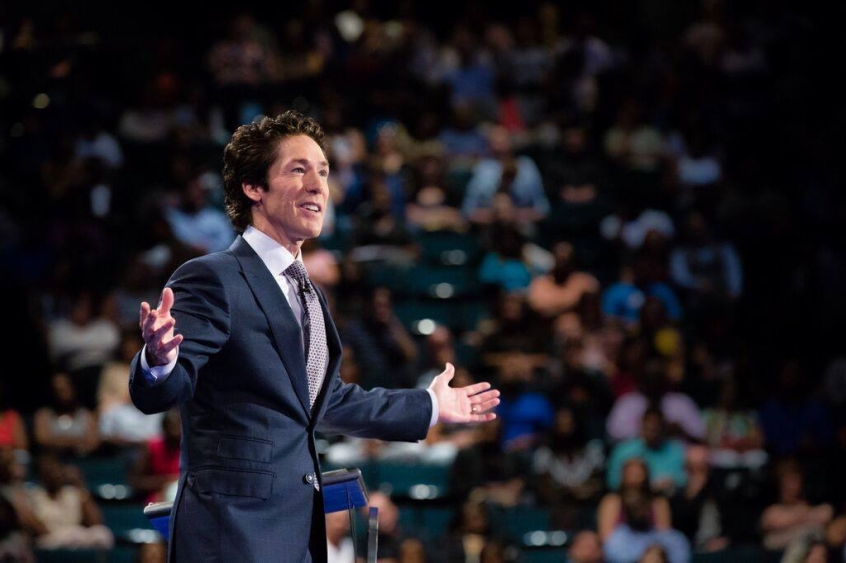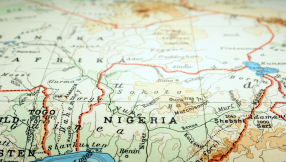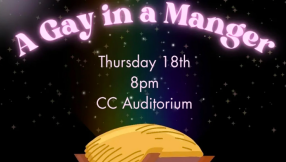Megachurch pastor and prosperity gospel preacher Joel Osteen came under heavy fire online this week for not immediately opening his 16,000 seat megachurch to the homeless victims of Hurricane Harvey in Houston, Texas.
The arena complex that is Lakewood Church has now been opened to the needy, but the vicious mob reaction to Osteen remains troubling. The online outrage is understandable, but there's a fine line between calling out injustice and just being judgmental. Mass tragedy probably shouldn't have us at each other's throats. So what's going on with the hate for Joel Osteen?

The prince in his palace
Osteen is something of an easy target. As Kate Bowler explained for the Washington Post, the man is 'America's prince of the prosperity gospel', a polished symbol of the wealth and material blessing that he promises to his megachurch flock.
She writes: 'With his yachts and jets and endless-smiling mouth offering promises of "Your Best Life Now" (that's the name of his best-selling book), Osteen was already a subject of contempt among Americans'. Seeing images of Osteen's vast, lavish mansion alongside footage of homes submerged by the wake of Hurricane Harvey obviously creates a discord. It seems wrong and cruel, apparent evidence of the pastor's distance from the people he serves.
The mob sees the prince in his palace, feeding off his bestselling book-sales and packed-out arena crowds, but apparently closing church doors when the multitude comes knocking (though the church has insisted its doors were never 'closed').
Writer Alan Spencer tweeted: 'Joel Osteen won't open his church that holds 16,000 to hurricane victims because it only provides shelter from taxes'.
Hollywood director Scott Derrickson went as far as to call him 'a wolf in sheep's clothing', using the imagery of the 'false prophet' that Jesus warned of.
Insofar as the outrage highlights the huge problems at the heart of the prosperity gospel movement, and the wealthy icons at its helm, it isn't wrong. Money isn't evil, but having it in indulgent abundance whilst poverty pervades even in the prosperous west, is troubling. And a gospel that makes material gain the goal is a false, supremely dangerous one – which misses that Jesus said the Kingdom of God belonged to the poor.
Some of the anger at Osteen (and let's be clear, Lakewood's complex is now fully open as a shelter for homeless) points to pervasive social injustice, questions about wealthy excess at the expense of the poor, and some seriously dubious Christian leadership. And that's not wrong.
Someone to blame
Then again, in times of crisis, sometimes people just want someone to blame. But when the disaster is a natural one that clearly can't be curtailed by human powers, who can be blamed? It's traditional of course, to question God in these times – wrestling with the divine over the ever-compelling problem of human suffering and God's place in it all.
Is he the distant uncaring deity, or the active judge directly dealing out disaster? Of course, traditional Christian theology has said neither is the case, but many, having rejected faith, may no longer ask such questions anyway. In which case, they're looking for someone to blame, and as we've seen, perhaps the boot fits (or feels like it does) with Osteen. It's hard to direct anger at vast, uncontrollable forces – but specific persons are easier to hate.
But that doesn't make it right. And goading virtue and charity out of someone through an angry online mob hardly seems the way it should be. One Twitter user condemned Osteen as a 'parasite', sharing a meme that wrote: 'And lo, Jesus fed the needy only after receiving a massive public shaming on Twitter.' But does anyone really want the fear of public shaming to be the new driver for human generosity?
Broken world, broken people
At the end of the day, we're not responsible for Osteen, his wealth or his church. It's fine to feel angry (if there's just cause), but something tells me Christ would have us looker closer at ourselves before we start judging others for un-generosity. It's not like only the super-rich have the capacity to give, and to publicly throw Osteen to the lions if we haven't lifted a charitable finger ourselves would be a tragic kind of hypocrisy.
The world is broken, which is why we have natural disasters, deep human suffering and unanswered questions for God. Human beings are broken too, which is why crisis can make us turn on each other, seeking a scapegoat instead of focusing on helping the hurting. Seeing the tragedy wrought by Hurricane Harvey is heartbreaking. Many have died, thousands have lost their livelihoods. We often don't know what to do about it, because in the face of it all we're only human.
But embracing our humanity, our flaws and our limits, may be the way forward. That probably means more prayer and less public shaming. Having grace for each other, for those in need and for Joel Osteen – whatever we think of him. It seems more promising than the torch and pitchfork, at least.
You can follow @JosephHartropp on Twitter













